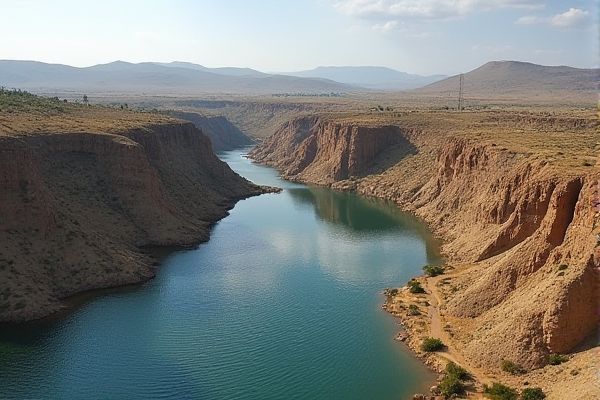
Water engineering diploma holders in Zambia can explore various job opportunities across multiple sectors. Local municipalities often seek skilled professionals for roles in water supply management, ensuring access to clean drinking water and efficient waste management systems. Non-governmental organizations actively engage in projects focused on sustainable water resources, offering positions in project management, community outreach, and environmental monitoring. The private sector also requires expertise in water treatment plants, irrigation systems, and consultancy services for developing infrastructure projects.
Job Description
In Zambia, a diploma in water engineering opens doors to various career opportunities, such as water resource management, wastewater treatment, and infrastructure development. Professionals in this field work to design, implement, and maintain systems that ensure safe and efficient water supply and sanitation services. Your role may involve collaborating with government agencies, NGOs, and communities to address water-related challenges and promote sustainable practices. Staying updated on local regulations and environmental standards is crucial for success in the rapidly evolving water sector in Zambia.
Requirement
A diploma in water engineering opens various job opportunities in Zambia, particularly within government agencies, non-governmental organizations, and private sector companies. Employers typically require candidates to have a solid understanding of water resource management, hydraulic systems, and environmental impacts. Proficiency in software relevant to water modeling and design can enhance your prospects in this competitive field. Strong communication skills and the ability to work in teams are also essential in collaborating with diverse stakeholders on water-related projects.
Salary and Perks Expected
A diploma in water engineering in Zambia can open doors to various job opportunities within the water supply and sanitation sector. Entry-level positions typically offer salaries ranging from ZMW 7,000 to ZMW 12,000 per month, depending on the organization and location. As you gain experience, salaries can increase significantly, with senior positions offering anywhere from ZMW 15,000 to ZMW 25,000 or more monthly. In addition to competitive salaries, many employers in Zambia provide perks such as health insurance, transport allowances, and opportunities for professional development.
Similar Job Names
- Water Resources Engineer
- Hydrologist
- Water Quality Analyst
- Environmental Engineer
- Civil Engineer (Water Projects)
- Water Supply Technician
- Sanitation Engineer
- Irrigation Engineer
- Water Treatment Plant Operator
- Water Systems Designer
- Hydrogeologist
- Wastewater Engineer
- Community Water Supply Specialist
- Project Coordinator (Water Projects)
- Field Technician (Water Resources)
Job Expectation Concept
A diploma in water engineering opens the door to various job opportunities in Zambia's growing water sector. Position roles often include water resource management, treatment facility operation, and infrastructure development, all essential for meeting the country's water supply needs. Employers typically seek individuals who are skilled in both technical and analytical tasks, emphasizing problem-solving abilities to address local challenges. Engaging in fieldwork and collaborating with communities are vital components of these roles, ensuring that your contributions directly impact public health and environmental sustainability.
Career Advantage and Weakness
In Zambia, a diploma in water engineering can offer significant career advantages, such as access to roles in a sector critical for national development. The demand for skilled professionals in water resource management and infrastructure is increasing, providing ample job opportunities with competitive salaries. However, there may be weaknesses associated with this qualification, including limited recognition compared to a degree, which can impact career advancement in certain organizations. Understanding these factors can help you navigate your career path more effectively within the Zambian job market.
Important Thing Must Know
A diploma in water engineering opens various job opportunities in Zambia, given the country's focus on improving its water management systems. You can find roles within government agencies, non-governmental organizations, and private firms that specialize in water resources development and environmental management. Positions may include water quality analyst, hydraulic engineer, and infrastructure project manager, which are critical in addressing Zambia's water supply and sanitation challenges. Understanding local regulations and environmental conditions is essential for effective planning and implementation of water projects. Pursuing this diploma can significantly enhance your career prospects in the growing water engineering field in Zambia.
Alternative Career Options
The skills acquired through a diploma in water engineering can open doors to various career paths beyond traditional roles. In Zambia, opportunities exist in environmental consulting, where you can engage in projects focused on sustainable water management and conservation practices. You may also explore roles in government agencies, contributing to policy-making and infrastructure development related to water resources. Additionally, the private sector frequently seeks experts for roles in water supply systems, wastewater treatment, and community health initiatives, offering a chance to make a tangible impact on public health and safety.
Companies List
- ZESCO Limited
- Lusaka Water and Sewerage Company
- National Water Supply and Sanitation Council
- Southern Water and Sanitation Company
- Copperbelt Energy Corporation
- Mulonga Water Supply and Sanitation Company
- Kafubu Water and Sanitation Company
- Rural Water Supply and Sanitation Program (RWSSP)
- African Water Association
- WaterAid Zambia
List of Ideal City
Lusaka, the capital city of Zambia, offers numerous opportunities in water engineering due to its ongoing urban development projects and government initiatives aimed at improving water supply and sanitation. Ndola, located on the Copperbelt, is a significant industrial hub where water engineering professionals are needed to support the growing infrastructure demands. Kitwe is another key city where job prospects in the field arise from the need for sustainable water management solutions. Living or working in these cities can enhance your career in water engineering, reflecting the country's commitment to enhancing its water resources and services.
 zambia-jobs.com
zambia-jobs.com